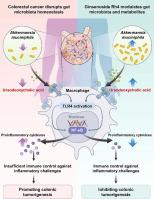人参皂苷 Rh4 通过调节肠道微生物群介导的胆汁酸代谢抑制结直肠癌。
IF 11.4
1区 综合性期刊
Q1 MULTIDISCIPLINARY SCIENCES
引用次数: 0
摘要
导言:肠道微生物群失调正在成为结直肠癌(CRC)发病机制中的一个关键因素。人参皂苷 Rh4(Rh4)是从人参中分离出来的一种活性化合物,在调节肠道炎症和肠道微生物群失调方面具有有益作用,但 Rh4 如何调节肠道微生物群以缓解 CRC 仍未得到充分探索:我们研究了 Rh4 对 CRC 的影响及其通过调节肠道微生物群抑制 CRC 的作用机制:方法:我们使用AOM/DSS模型,并采用转录组学、基因组学和代谢组学技术来探讨Rh4对CRC的抑制作用。此外,我们还采用了抗生素治疗和粪便微生物群移植(FMT)实验来研究肠道微生物群的作用。最后,我们阐明了Rh4调控的关键功能菌和代谢产物在CRC中的关键作用:我们的研究结果表明,Rh4 能修复 CRC 引起的肠道屏障损伤,缓解肠道炎症,抑制 CRC 的发展。此外,Rh4 还能以肠道微生物群依赖的方式抑制 CRC。Rh4 增加了肠道微生物群的多样性,富集了益生菌 Akkermansia muciniphila(A. muciniphila),缓解了 CRC 引起的肠道微生物群失调。随后,Rh4 对 A. muciniphila 介导的胆汁酸代谢进行了调节。粘蛋白噬菌体通过提高 7α- 羟基类固醇脱氢酶(7α-HSDH)的活性来促进 UDCA 的产生。UDCA进一步激活了FXR,调节了TLR4-NF-κB信号通路,从而抑制了CRC的发展:我们的研究结果证实,Rh4通过调节肠道微生物群介导的胆汁酸代谢和促进UDCA的产生,进一步激活FXR受体并调节TLR4-NF-κB信号通路,从而以肠道微生物群依赖的方式抑制CRC。我们的研究结果证实,Rh4 有可能被用作肠道微生物群的调节剂,用于预防和治疗 CRC。本文章由计算机程序翻译,如有差异,请以英文原文为准。

Ginsenoside Rh4 inhibits colorectal cancer via the modulation of gut microbiota-mediated bile acid metabolism
Introduction
Dysbiosis of the gut microbiota is emerging as a pivotal factor in the pathogenesis of colorectal cancer (CRC). Ginsenoside Rh4 (Rh4) is an active compound isolated from ginseng with beneficial effects in modulating intestinal inflammation and gut microbiota dysbiosis, but how Rh4 regulates the gut microbiota to alleviate CRC remains underexplored.
Objectives
We investigated the impact of Rh4 on CRC and the mechanism of its action in inhibiting CRC via modulation of gut microbiota.
Methods
We used the AOM/DSS model and employed transcriptomics, genomics and metabolomics techniques to explore the inhibitory impact of Rh4 on CRC. Furthermore, we employed experiments involving antibiotic treatment and fecal microbiota transplantation (FMT) to investigate the role of the gut microbiota. Finally, we elucidated the pivotal role of key functional bacteria and metabolites regulated by Rh4 in CRC.
Results
Our research findings indicated that Rh4 repaired intestinal barrier damage caused by CRC, alleviated intestinal inflammation, and inhibited the development of CRC. Additionally, Rh4 inhibited CRC in a gut microbiota-dependent manner. Rh4 increased the diversity of gut microbiota, enriched the probiotic Akkermansia muciniphila (A. muciniphila), and alleviated gut microbiota dysbiosis caused by CRC. Subsequently, Rh4 regulated A. muciniphila-mediated bile acid metabolism. A. muciniphila promoted the production of UDCA by enhancing the activity of 7α-hydroxysteroid dehydrogenase (7α-HSDH). UDCA further activated FXR, modulated the TLR4-NF-κB signaling pathway, thus inhibiting the development of CRC.
Conclusion
Our results confirm that Rh4 inhibits CRC in a gut microbiota-dependent manner by modulating gut microbiota-mediated bile acid metabolism and promoting the production of UDCA, which further activates the FXR receptor and regulates the TLR4-NF-κB signaling pathway. Our results confirm that Rh4 has the potential to be used as a modulator of gut microbiota for preventing and treatment of CRC.
求助全文
通过发布文献求助,成功后即可免费获取论文全文。
去求助
来源期刊

Journal of Advanced Research
Multidisciplinary-Multidisciplinary
CiteScore
21.60
自引率
0.90%
发文量
280
审稿时长
12 weeks
期刊介绍:
Journal of Advanced Research (J. Adv. Res.) is an applied/natural sciences, peer-reviewed journal that focuses on interdisciplinary research. The journal aims to contribute to applied research and knowledge worldwide through the publication of original and high-quality research articles in the fields of Medicine, Pharmaceutical Sciences, Dentistry, Physical Therapy, Veterinary Medicine, and Basic and Biological Sciences.
The following abstracting and indexing services cover the Journal of Advanced Research: PubMed/Medline, Essential Science Indicators, Web of Science, Scopus, PubMed Central, PubMed, Science Citation Index Expanded, Directory of Open Access Journals (DOAJ), and INSPEC.
 求助内容:
求助内容: 应助结果提醒方式:
应助结果提醒方式:


